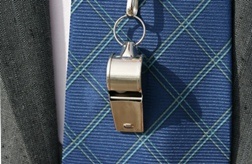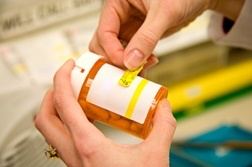LAWSUITS NEWS & LEGAL INFORMATION
Qui Tam Whistleblower
Read our Qui Tam FAQ
By Jane Mundy
Qui tam is a law passed by Congress that allows a private individual with knowledge of fraud committed against the federal government to act as a government whistleblower and bring about a qui tam lawsuit on behalf of the US. Any situation where a company or individual has defrauded the government comes under the False Claims Act, including Medicare fraud and pharmaceutical fraud.
 Qui tam is a provision of the False Claims Act that allows a whistle blower to bring a lawsuit on behalf of the US government for a fraud committed against the United States. A government whistleblower who successfully files a qui tam lawsuit is entitled to receive between 15 percent and 30 percent of the lawsuit settlement funds recovered for the government.
Qui tam is a provision of the False Claims Act that allows a whistle blower to bring a lawsuit on behalf of the US government for a fraud committed against the United States. A government whistleblower who successfully files a qui tam lawsuit is entitled to receive between 15 percent and 30 percent of the lawsuit settlement funds recovered for the government.
A considerable amount (estimates are as high as 10 percent) of the US annual budget is paid to companies or individuals who defraud the government, usually by overcharging, submitting bills for services never performed, or over-billing for services provided. Qui tam whistleblower lawsuits include government contract fraud, defense contractor fraud, Medicare fraud, Medicaid fraud, pharmaceutical fraud and other public benefit fraud.
Over one thousand qui tam lawsuits were filed between 1987 and 1995 and from 1988 to 1995 over $1 billion was recovered by qui tam lawyers, either in settlements or lawsuit verdicts filed by government whistleblowers. Since 1986, the government has recovered over $2 billion as a result of these lawsuits, of which almost $340 million has been paid to whistleblowers, also known as "relators".
 Typically, fraud cases are related to where the government is spending the most money. For instance, in the late 1980s, many qui tam lawsuits involved the defense industry. Recently, health care and pharmaceutical cases have been foremost.
Typically, fraud cases are related to where the government is spending the most money. For instance, in the late 1980s, many qui tam lawsuits involved the defense industry. Recently, health care and pharmaceutical cases have been foremost.
In 2001, the US Department of Justice reported $1.2 billion of the Department's settlements and judgments related to cases filed under the federal whistleblower statute. In the fiscal year October 2000 to September 2001, more than $210 million was awarded to federal whistleblowers. Health care was the largest category of fraud recoveries with the runner-up involving oil and other minerals extracted from public lands.
The Department's record level of recoveries for fiscal year 2001 also included the following:
As much as 10 percent of Medicare charges are fraudulent. Some examples of fraud are:
Thanks in large part to whistleblowers filing qui tam lawsuits, the US government is cracking down on pharmaceutical companies and their employees for using illegal sales and marketing tactics. Typically, pharma whistleblowers are insiders, such as sales executives and representatives and doctors and others who know of ways drug companies persuade healthcare providers to prescribe certain drugs, conceal data from clinical trials, off-label marketing, and more.
 But some doctors are involved in fraudulent practices. For instance, TAP Pharmaceuticals Inc. provided doctors with free Lupron samples, which the doctors billed to federal programs at the list price and then pocketed the payments. TAP pleaded guilty to participating in a criminal conspiracy and paid $875 million to settle criminal and civil fraud charges. An Oregon doctor paid $213,000 to the federal government for improperly billing Medicare and other federal health programs for free samples of Lupron he had been given by TAP.
But some doctors are involved in fraudulent practices. For instance, TAP Pharmaceuticals Inc. provided doctors with free Lupron samples, which the doctors billed to federal programs at the list price and then pocketed the payments. TAP pleaded guilty to participating in a criminal conspiracy and paid $875 million to settle criminal and civil fraud charges. An Oregon doctor paid $213,000 to the federal government for improperly billing Medicare and other federal health programs for free samples of Lupron he had been given by TAP.
Some other examples of pharmaceutical fraud are the following:
September, 2009: Pfizer agreed to pay $2.3 billion for its illegal marketing of the painkiller Bextra and other drugs. Pfizer admitted it encouraged doctors to prescribe Bextra to treat acute pain and other ailments the drug was not intended for, a practice banned by the FDA.
January 19, 2010: A civil False Claims Act complaint was filed against drug manufacturer Johnson & Johnson by the US, alleging that J&J paid kickbacks to Omnicare, the nation's largest pharmacy, so it would purchase and recommend J&J drugs, including the anti-psychotic drug Risperdal, for use in nursing homes.
March 16, 2010: Pharmaceutical manufacturer Alpharma, Inc. agreed to pay $42.5 million to resolve False Claims Act allegations in connection with the marketing of the morphine-based drug, Kadian.
 April 27, 2010: AstraZeneca agreed to pay $520 million to federal and state taxpayers to settle claims that it illegally marketed the anti-psychotic drug Seroquel for uses that were not approved as safe and effective by the Food and Drug Administration (FDA).
April 27, 2010: AstraZeneca agreed to pay $520 million to federal and state taxpayers to settle claims that it illegally marketed the anti-psychotic drug Seroquel for uses that were not approved as safe and effective by the Food and Drug Administration (FDA).
April 29, 2010: The US Department of Justice announced that Ortho-McNeil Pharmaceutical and Ortho-McNeil-Janssen Pharmaceuticals Inc., both subsidiaries of Johnson & Johnson, agreed to pay more than $81 million to resolve criminal and civil liability arising from the off-label promotion of its epilepsy drug Topamax.
Whistleblower Dr. Gary R Spivack, a psychiatrist from northern Virginia, alleged in his 2003 qui tam lawsuit that Ortho-McNeil paid doctors kickbacks to encourage them to prescribe Topamax for many "off-label" uses (not approved by the FDA), including weight loss, alcohol dependence, eating disorders and mood and anxiety disorders, with disregard to patients' health.
Dr Spivack became aware of Topamax for off-label uses when he attended a "Psychiatry Consultants' Conference" sponsored by the Ortho-McNeil. Attendees were paid $500 each or more as "consultants" to attend the meeting and listen to the pharma company presentations.
Congress added Whistleblower protections to the False Claims Act in 1986, which entitles the whistleblower to reinstatement with seniority, double back pay, interest, special damages sustained as a result of discriminatory treatment, and attorneys fees and costs, even if the case is never filed, as long as the whistle blower's allegations could legitimately support a False Claims Act case.
 The False Claims Act also protects qui tam plaintiffs who are "demoted, suspended, threatened, harassed or in any other manner discriminated against in the terms and conditions of employment" for acts done in furtherance of filing a claim under the Act.
The False Claims Act also protects qui tam plaintiffs who are "demoted, suspended, threatened, harassed or in any other manner discriminated against in the terms and conditions of employment" for acts done in furtherance of filing a claim under the Act.
These whistleblower protections have encouraged more qui tam cases. Especially with assistance from a qui tam lawyer experienced with settlement negotiations, many defendants—from large corporations to individuals—are eager to settle qui tam lawsuits.
If you think you have witnessed a violation of the False Claims Act and you are willing to become a qui tam whistleblower, you should first speak to an experienced qui tam attorney to see if you have a case, determine any deadlines for bringing a legal claim, and assist you with bringing a lawsuit on behalf of the US government to recover damages for fraudulent practices.
Last updated on
FREE QUI TAM LAWSUIT EVALUATION
Send your Qui Tam claim to a lawyer who will review your claim at NO COST or obligation.
GET LEGAL HELP NOW
GET LEGAL HELP NOW
Qui Tam Government Whistleblower
 Qui tam is a provision of the False Claims Act that allows a whistle blower to bring a lawsuit on behalf of the US government for a fraud committed against the United States. A government whistleblower who successfully files a qui tam lawsuit is entitled to receive between 15 percent and 30 percent of the lawsuit settlement funds recovered for the government.
Qui tam is a provision of the False Claims Act that allows a whistle blower to bring a lawsuit on behalf of the US government for a fraud committed against the United States. A government whistleblower who successfully files a qui tam lawsuit is entitled to receive between 15 percent and 30 percent of the lawsuit settlement funds recovered for the government.A considerable amount (estimates are as high as 10 percent) of the US annual budget is paid to companies or individuals who defraud the government, usually by overcharging, submitting bills for services never performed, or over-billing for services provided. Qui tam whistleblower lawsuits include government contract fraud, defense contractor fraud, Medicare fraud, Medicaid fraud, pharmaceutical fraud and other public benefit fraud.
Qui tam Lawsuits and Settlements
 Typically, fraud cases are related to where the government is spending the most money. For instance, in the late 1980s, many qui tam lawsuits involved the defense industry. Recently, health care and pharmaceutical cases have been foremost.
Typically, fraud cases are related to where the government is spending the most money. For instance, in the late 1980s, many qui tam lawsuits involved the defense industry. Recently, health care and pharmaceutical cases have been foremost.In 2001, the US Department of Justice reported $1.2 billion of the Department's settlements and judgments related to cases filed under the federal whistleblower statute. In the fiscal year October 2000 to September 2001, more than $210 million was awarded to federal whistleblowers. Health care was the largest category of fraud recoveries with the runner-up involving oil and other minerals extracted from public lands.
The Department's record level of recoveries for fiscal year 2001 also included the following:
- $27 million from National Healthcare Corporation for alleged false claims to Medicare, resulting from inflating the amount of time spent caring for nursing home patients;
- $22.5 million from the University of California for alleged false claims by UC's five teaching hospitals for reimbursement under Medicare and other federal health insurance programs for services purportedly performed or supervised by faculty physicians rather than by residents without supervision, and for upcoding - the improper assignment of diagnostic codes for the purpose of increasing reimbursement amounts;
- $16 million to resolve claims that several research hospitals unlawfully charged Medicare and other federal health care programs for surgical procedures using experimental cardiac devices;
- $15.7 million from Contech Construction for alleged false claims for providing pipe in connection with a Department of Transportation contract that did not conform with contract specifications;
- $9 million from Gateway for allegedly failing to pass along to the government price reductions required under a multiple award schedule contract for computers and components; and
- $14 million from Bayer, including $6.2 million on behalf of 45 states for their share of Medicaid payments for prescription costs allegedly inflated by the company's fraudulent practices.
Medicare Fraud
- Billing more than once for the same service
- Charging for services not performed
- Offering free items or services in exchange for a Medicare or Medicaid number
- Billing for expensive equipment and only providing cheaper equipment
- Waiving co-payments routinely
- Someone other than the physician completing the Certificate of Medical Necessity
Pharmaceutical Fraud
 But some doctors are involved in fraudulent practices. For instance, TAP Pharmaceuticals Inc. provided doctors with free Lupron samples, which the doctors billed to federal programs at the list price and then pocketed the payments. TAP pleaded guilty to participating in a criminal conspiracy and paid $875 million to settle criminal and civil fraud charges. An Oregon doctor paid $213,000 to the federal government for improperly billing Medicare and other federal health programs for free samples of Lupron he had been given by TAP.
But some doctors are involved in fraudulent practices. For instance, TAP Pharmaceuticals Inc. provided doctors with free Lupron samples, which the doctors billed to federal programs at the list price and then pocketed the payments. TAP pleaded guilty to participating in a criminal conspiracy and paid $875 million to settle criminal and civil fraud charges. An Oregon doctor paid $213,000 to the federal government for improperly billing Medicare and other federal health programs for free samples of Lupron he had been given by TAP.Some other examples of pharmaceutical fraud are the following:
September, 2009: Pfizer agreed to pay $2.3 billion for its illegal marketing of the painkiller Bextra and other drugs. Pfizer admitted it encouraged doctors to prescribe Bextra to treat acute pain and other ailments the drug was not intended for, a practice banned by the FDA.
January 19, 2010: A civil False Claims Act complaint was filed against drug manufacturer Johnson & Johnson by the US, alleging that J&J paid kickbacks to Omnicare, the nation's largest pharmacy, so it would purchase and recommend J&J drugs, including the anti-psychotic drug Risperdal, for use in nursing homes.
March 16, 2010: Pharmaceutical manufacturer Alpharma, Inc. agreed to pay $42.5 million to resolve False Claims Act allegations in connection with the marketing of the morphine-based drug, Kadian.
 April 27, 2010: AstraZeneca agreed to pay $520 million to federal and state taxpayers to settle claims that it illegally marketed the anti-psychotic drug Seroquel for uses that were not approved as safe and effective by the Food and Drug Administration (FDA).
April 27, 2010: AstraZeneca agreed to pay $520 million to federal and state taxpayers to settle claims that it illegally marketed the anti-psychotic drug Seroquel for uses that were not approved as safe and effective by the Food and Drug Administration (FDA).April 29, 2010: The US Department of Justice announced that Ortho-McNeil Pharmaceutical and Ortho-McNeil-Janssen Pharmaceuticals Inc., both subsidiaries of Johnson & Johnson, agreed to pay more than $81 million to resolve criminal and civil liability arising from the off-label promotion of its epilepsy drug Topamax.
Whistleblower Dr. Gary R Spivack, a psychiatrist from northern Virginia, alleged in his 2003 qui tam lawsuit that Ortho-McNeil paid doctors kickbacks to encourage them to prescribe Topamax for many "off-label" uses (not approved by the FDA), including weight loss, alcohol dependence, eating disorders and mood and anxiety disorders, with disregard to patients' health.
Dr Spivack became aware of Topamax for off-label uses when he attended a "Psychiatry Consultants' Conference" sponsored by the Ortho-McNeil. Attendees were paid $500 each or more as "consultants" to attend the meeting and listen to the pharma company presentations.
Whistleblower Protection
 The False Claims Act also protects qui tam plaintiffs who are "demoted, suspended, threatened, harassed or in any other manner discriminated against in the terms and conditions of employment" for acts done in furtherance of filing a claim under the Act.
The False Claims Act also protects qui tam plaintiffs who are "demoted, suspended, threatened, harassed or in any other manner discriminated against in the terms and conditions of employment" for acts done in furtherance of filing a claim under the Act.These whistleblower protections have encouraged more qui tam cases. Especially with assistance from a qui tam lawyer experienced with settlement negotiations, many defendants—from large corporations to individuals—are eager to settle qui tam lawsuits.
If you think you have witnessed a violation of the False Claims Act and you are willing to become a qui tam whistleblower, you should first speak to an experienced qui tam attorney to see if you have a case, determine any deadlines for bringing a legal claim, and assist you with bringing a lawsuit on behalf of the US government to recover damages for fraudulent practices.
Qui Tam Whistleblower Legal Help
If you suspect your employer has engaged in fraudulent activity and wish to speak with a Whistleblower Attorney, please click the link below and your complaint will be sent to a whistleblower lawyer who may evaluate your claim at no cost or obligation.Last updated on
QUI TAM LEGAL ARTICLES AND INTERVIEWS
2018 Busy Year for HealthCare Whistleblowers

The Legal Landscape for Whistleblowers May Have Changed

Medical Device Manufacturer Admits to Wrongdoing, Faces $14 Million Penalty


January 23, 2019
Of more than $ 2.8 billion that the Department of Justice (DOJ)obtained in settlements and judgments from fraudsters in 2018, $2.5 billion involved the health care industry, and the largest recoveries came from drug and medical device manufacturers. And 2018 was a very good year for most all Whistleblowers (three whistleblower fraudsters were also busted last year.) READ MORE
The Legal Landscape for Whistleblowers May Have Changed

March 2, 2018
Washington, DC: The filing of an SEC whistleblower lawsuit may become that much more focused following a recent decision by the US Supreme Court that puts the emphasis on the reporting of apparent corporate wrongdoing to the US Securities and Exchange Commission (SEC), as required under guidelines entrenched in the Dodd-Frank Act. READ MORE
Medical Device Manufacturer Admits to Wrongdoing, Faces $14 Million Penalty

February 2, 2018
Washington, DC: It was a little over a year ago that the US Securities and Exchange Commission (SEC) issued an official press release announcing that a Texas-based medical device company, Orthofix International (Orthofix), had agreed to pay $14 million to settle charges brought by the regulator with the help of two SEC fraud whistleblowers. Orthofix, which has faced a SEC whistleblower lawsuit in the past, also agreed to admit to wrongdoing. READ MORE
MORE QUI TAM LEGAL NEWS
- Plaintiff Wants Appeal of Years-Long Claims, Defendant Opines to ‘Get on with It’
- Why the Bid to Dismiss SEC Whistleblower Lawsuit against Wells Fargo Failed
- Healthcare Whistle Blower Awarded $351,000
- Untold Story of Opioid Epidemic: Attorney Explains Kickbacks and Billing Fraud
READ MORE Whistleblower Settlements and Legal News
READ MORE Civil/Human Rights Settlements and Legal News
READ MORE Consumer Fraud Settlements and Legal News
READ MORE Financial Settlements and Legal News
READ MORE Insurance Settlements and Legal News
READ MORE Whistleblower Settlements and Legal News
READ MORE Civil/Human Rights Settlements and Legal News
READ MORE Consumer Fraud Settlements and Legal News
READ MORE Financial Settlements and Legal News
READ MORE Insurance Settlements and Legal News
READ MORE Whistleblower Settlements and Legal News

READER COMMENTS
Greg Marsh, Exposure Scientist
on
deni labelle
on
Our case is that the US Land Patent Office were defrauded by a group of land speculators who defrauded the US and our family causing 3 land patents to be issued to a lND SPECULATOR in the Wilamette Valley (WA) and Bayou Lafourche (LA).
These lands consists of eight thousand (8,000) acres producing oil and gas, right of ways and finally real estate valuing over millions of dollars for 100 years.
I am the administrator of our case for the family. Will bring suit with Attorney now!